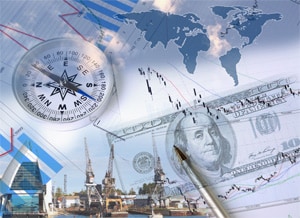ANNUAL SURVEY AND AWARDS: LIQUIDITY AND REGULATIONS SQUEEZE TRADE FINANCE
By Gordon Platt
The global economy is threatened by a shortage of financing for international trade, as banks reassess their business models.

The availability and cost of trade financing could be key factors in determining whether or not the global economy can continue to expand in the year ahead, bankers say. When the European sovereign debt crisis worsened last September, banks in Europe experienced a shortage of dollars—the main currency of world trade. Meanwhile, European banks are deleveraging and withdrawing credit from Asia, an important region for global trade. Although stronger competitors will take up some of the slack, prices for trade finance are rising. As regulators discuss new capital requirements for banks, some institutions are abandoning the trade finance business altogether. Those that stay will increase deal scrutiny and pass on higher capital costs to their customers.
Supply chains are becoming increasingly global and more complex. They are subject to disruption by distant events, as demonstrated by the earthquake and tsunami in Japan last year. Bankers and traders are adopting Web-based platforms, as the worlds of trade and cash management merge and open-account systems replace letters of credit in many instances.
At Sibos in Toronto last September, financial messaging provider SWIFT and the ICC Banking Commission signed a cooperation agreement that will enable industry-wide adoption of the bank payment obligation (BPO). This alternative means of settlement provides the benefits of a letter of credit in an automated environment, according to SWIFT and the commission. They plan to publish and maintain a set of rules that will establish uniformity of practice in the market adoption of the BPO and related messaging standards.
Export credit agencies are also stepping up their support for trade. The US Export-Import Bank set export finance records for the third straight year in 2011. The Ex-Im Bank’s infrastructure-related financing reached $23 billion out of the bank’s total of $32 billion in overall financing last year. This was a result of the bank’s emphasis on nine developing countries with rapidly growing infrastructure needs. These markets are: Brazil, Colombia, India, Indonesia, Mexico, Nigeria, South Africa, Turkey and Vietnam.
Global Finance editors, with input from industry analysts, corporate executives and technology experts, selected the best trade finance banks in 77 countries or regions. Criteria for choosing the winners include: trade-related transaction volume, scope of global coverage, customer service, competitive pricing, risk management and innovative products, services and technology.
The winners comprise those trade finance banks that best serve the specialized needs of corporations as they engage in cross-border trade.




